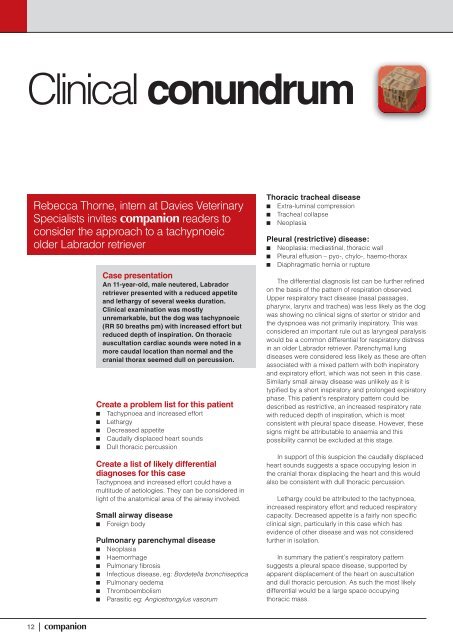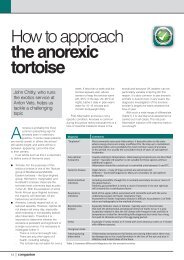Companion May 2012 - BSAVA
Companion May 2012 - BSAVA
Companion May 2012 - BSAVA
Create successful ePaper yourself
Turn your PDF publications into a flip-book with our unique Google optimized e-Paper software.
Clinical conundrum<br />
Rebecca Thorne, intern at Davies Veterinary<br />
Specialists invites companion readers to<br />
consider the approach to a tachypnoeic<br />
older Labrador retriever<br />
12 | companion<br />
Case presentation<br />
An 11-year-old, male neutered, Labrador<br />
retriever presented with a reduced appetite<br />
and lethargy of several weeks duration.<br />
Clinical examination was mostly<br />
unremarkable, but the dog was tachypnoeic<br />
(RR 50 breaths pm) with increased effort but<br />
reduced depth of inspiration. On thoracic<br />
auscultation cardiac sounds were noted in a<br />
more caudal location than normal and the<br />
cranial thorax seemed dull on percussion.<br />
Create a problem list for this patient<br />
■■ Tachypnoea and increased effort<br />
■■ Lethargy<br />
■■ Decreased appetite<br />
■■ Caudally displaced heart sounds<br />
■■ Dull thoracic percussion<br />
Create a list of likely differential<br />
diagnoses for this case<br />
Tachypnoea and increased effort could have a<br />
multitude of aetiologies. They can be considered in<br />
light of the anatomical area of the airway involved.<br />
Small airway disease<br />
■■ Foreign body<br />
Pulmonary parenchymal disease<br />
■■ Neoplasia<br />
■■ Haemorrhage<br />
■■ Pulmonary fibrosis<br />
■■ Infectious disease, eg: Bordetella bronchiseptica<br />
■■ Pulmonary oedema<br />
■■ Thromboembolism<br />
■■ Parasitic eg: Angiostrongylus vasorum<br />
Thoracic tracheal disease<br />
■■ Extra-luminal compression<br />
■■ Tracheal collapse<br />
■■ Neoplasia<br />
Pleural (restrictive) disease:<br />
■■ Neoplasia: mediastinal, thoracic wall<br />
■■ Pleural effusion – pyo-, chylo-, haemo-thorax<br />
■■ Diaphragmatic hernia or rupture<br />
The differential diagnosis list can be further refined<br />
on the basis of the pattern of respiration observed.<br />
Upper respiratory tract disease (nasal passages,<br />
pharynx, larynx and trachea) was less likely as the dog<br />
was showing no clinical signs of stertor or stridor and<br />
the dyspnoea was not primarily inspiratory. This was<br />
considered an important rule out as laryngeal paralysis<br />
would be a common differential for respiratory distress<br />
in an older Labrador retriever. Parenchymal lung<br />
diseases were considered less likely as these are often<br />
associated with a mixed pattern with both inspiratory<br />
and expiratory effort, which was not seen in this case.<br />
Similarly small airway disease was unlikely as it is<br />
typified by a short inspiratory and prolonged expiratory<br />
phase. This patient’s respiratory pattern could be<br />
described as restrictive, an increased respiratory rate<br />
with reduced depth of inspiration, which is most<br />
consistent with pleural space disease. However, these<br />
signs might be attributable to anaemia and this<br />
possibility cannot be excluded at this stage.<br />
In support of this suspicion the caudally displaced<br />
heart sounds suggests a space occupying lesion in<br />
the cranial thorax displacing the heart and this would<br />
also be consistent with dull thoracic percussion.<br />
Lethargy could be attributed to the tachypnoea,<br />
increased respiratory effort and reduced respiratory<br />
capacity. Decreased appetite is a fairly non specific<br />
clinical sign, particularly in this case which has<br />
evidence of other disease and was not considered<br />
further in isolation.<br />
In summary the patient’s respiratory pattern<br />
suggests a pleural space disease, supported by<br />
apparent displacement of the heart on auscultation<br />
and dull thoracic percusion. As such the most likely<br />
differential would be a large space occupying<br />
thoracic mass.



